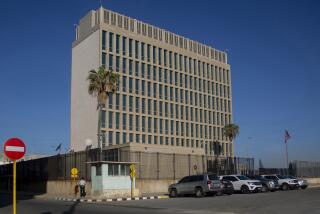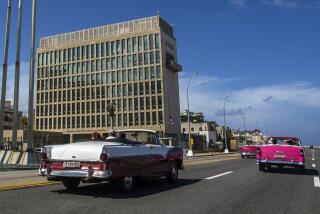No Single Cause Found for ‘Gulf War Syndrome’
- Share via
WASHINGTON — The Defense Department said Tuesday that it has been unable to find any medical evidence pointing to a single cause for the widely reported “Gulf War syndrome,” but it vowed to intensify its research and to set up special centers to treat the illness.
In a preliminary report, officials said examinations of 1,019 Persian Gulf War veterans who have complained of unusual symptoms show that 85% of the cases involve already recognizable illnesses, from arthritis to sleep disorders.
“There is no magic bullet,” Stephen Joseph, assistant secretary of defense for health affairs, told reporters at a briefing Tuesday. “We don’t find . . . any indication of a single . . . causality that would cover that broad spectrum.”
Pentagon officials emphasized Tuesday that they are not trying to suggest that there is no such illness as Gulf War syndrome, or that the veterans who have complained of such symptoms may be only imagining them.
But Joseph and Robert Roswell, executive director of the Gulf Veterans’ Coordinating Board, said that in 85% of the cases studied, the symptoms were found to have stemmed from one or more common illnesses that are treatable--and are to be expected in such a war.
Department officials said the military will establish two special treatment centers for those whose cases so far have defied diagnosis, and said the White House will propose spending an extra $15 million to $20 million next year to continue the research.
The announcements are likely to disappoint some veterans, who contend they suffer from a new disease and complain that the Pentagon has been unresponsive.
Some Gulf War veterans say they believe that the syndrome--which they describe as mysterious and untreatable--is being passed on to their spouses and children. The Pentagon has denied that the veterans were exposed to life-threatening chemicals.
Physicians said the 1,019 cases reflected in Tuesday’s report represent a significant sample of veterans who have sought treatment for Gulf War syndrome. Of the 697,000 who served in Operation Desert Storm, 11,000 have complained of illness. Some 8,000 are being processed.
Melanie Ayers, a Fayetteville, N.C., military spouse who heads Gulf War Babies, an organization of parents whose children have been afflicted, said the studies so far have been flawed because they have only involved volunteers and have not reviewed a broad enough sample.
“What they said (in Tuesday’s report) doesn’t make that much difference,” Ayers said in a telephone interview. Defense officials “need to get their act together and organize what they are doing.”
The common illnesses Pentagon officials said were responsible for most of the symptoms included circulatory and digestive problems, infections, specific injuries and blood disorders. About one-fourth of those evaluated reported psychological problems, including depression, headaches, post-traumatic stress disorder and anxiety.
Officials said the remaining 15% still are a mystery, but said it is unlikely that they would point to any one cause, either.
Joseph also dismissed speculation by some veterans’ groups that the syndrome may stem from exposure by soldiers to a toxic chemical agent or combination of chemicals, such as insect repellent and pyridostigmine bromide, which was taken by some soldiers as a vaccine.
The treatment centers the Pentagon is establishing will be based at Walter Reed Army Medical Center in Washington, D.C., and at the U.S. Air Force Medical Center and Brooke Army Medical Center in San Antonio, Tex.
More to Read
Sign up for Essential California
The most important California stories and recommendations in your inbox every morning.
You may occasionally receive promotional content from the Los Angeles Times.













